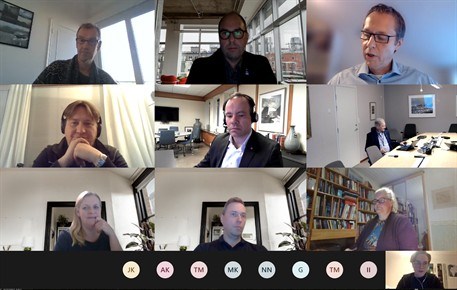NSPA and the EU Arctic Ambassador about EU Arctic Policy
On the 4th of November, the Brussels offices and steering committee of Northern Sparsely Populated Areas, NSPA, met with the EU Arctic Ambassador, Michael Mann, to discuss the NSPA's role in the EU's ongoing review of the 2016 Arctic Strategy. Mann emphasized the importance of continuing the dialogue and the interdependence between the EU and the NSPA.
The meeting aimed to give the NSPA the chance to present their views on the ongoing revise of the EU Arctic Policy and provide input regarding the renewal of the EU Arctic Strategy from 2016. Michael Mann, who is a part of the process of European External Action Service (EEAS) together with the European Commission, informed the meeting that the ongoing activities launched by the Commission, along with the public consultation, will form the basis for the EU Arctic Policy.

Nils-Olov Lindfors, NSPA´s chairman, and Norrbotten´s regional Councilor started by presenting the NSPA's views on the Arctic. Lindfors highlighted that the Arctic is an area of interest for future investment with well-developed cross-border cooperation. It is also an area with several technical solutions and refinement of natural resources, as well as active forestry in which will be important for the implementation of the European Green Deal.
Tomas Norvoll, regional councillor in Nordland, Norway, emphasized the importance of the EU even though Norway is not a member country due to Norway's exports and the geopolitical situation with Russia as a prominent neighbour country. Moreover, Norvoll stresses that the NSPA regions are facing challenges with an aging population and a decreasing population. The consequences are a deterioration of the security in the Arctic, as people are required to live, work, and operate in the region to keep it safe and alive.
Michael Mann announced that the European Commission is now summarizing the ambitions for the new EU Arctic policy, and emphasized the importance of a continued, mutual dialogue between the EU and the NSPA. He also pointed out that the NSPA works as a guide for the European Green Deal. However, there is a perception that developments in the Arctic are not sufficient, which has brought up the question of how to contribute to sustainable development in the NSPA in a greater extent. Although, with the United Kingdom's withdrawal from the EU there is a risk that the Northern Periphery and the Arctic program are becoming much smaller, or even disappearing. It is therefore necessary to put pressure to maintain the funds. Mann also emphasized the need for more concrete examples of the challenges regarding infrastructure in the Arctic.
NSPA´s view on the new EU Arctic Policy
The lack of infrastructure is a dilemma for the development in the NSPA, as well as for the European Arctic, which the EU should consider. In northern Sweden, northern Finland and northern Norway, increased transport options are needed, such as the double-track railway between Narvik and Kiruna, which is currently a bottleneck for the export of minerals and fish. In northern Finland, people cannot take advantage of the opportunities of digitalisation as there is a lack of broadband, which is crucial for companies' competitiveness and for people to be able to live in the region. The regions are not allowed to use Structural Funds for broadband expansion because the region is considered more developed than other regions the EU. The NSPA regions receive important EU funds, but if the EU does not understand the NSPA's so-called geographical handicap, or special conditions, the NSPA cannot address the Structural Funds where they best benefit the NSPA and in the long run also the EU.
Nils Kristian Sørheim Nilsen, head of North Norway's Brussels office, gave several examples of what the EU should pay regard to in the revision of the Arctic Policy. First, the lack of critical mass and competence can be facilitated with state support. Secondly, indigenous Sami people need a common EU program to support different areas of development. Thirdly, continued promotion of cooperation in the Barents region to maintain relations with Russia is important. He also emphasized that the definition of Arctic research must be broaden, as well as continue the investments in innovation systems such as testbeds for climate-related projects.
Kari Aalto, Head of the East & North Finland Office in Brussels, stressed importance of a continued dialogue in which Arctic citizens are included in discussions on the future development of the region.
Mikael Janson, director at North Sweden and the meeting chairman, stressed that the NSPA regions have great potential to further develop, however the regions are lacking critical mass do so effectively. The NSPA has much to offer the EU if they invest in the NSPA, Janson continued. He concluded by highlighting the final report produced based on the current Arctic Policy, the "EU Arctic Stakeholder Consultation Forum", which provides several concrete points for in-depth discussion of the EU's future investment priorities in the Arctic.
Read NSPA's position on the revision of Arctic policy here.
Read more about the current EU Arctic Policy here.
Read the report "EU Arctic Stakeholder Consultation Forum" here.
